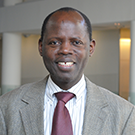Dr. Wassila Thiaw
Location: College Park MD
Office: NOAA's National Centers for Environmental Prediction Climate Prediction Center
Job Title: Meteorologist
Educational Background:
- Bachelor’s Degree in Meteorology from the University of Dakar, Senegal, West Africa
- Master’s Degree and Doctorate in Meteorology from the University of Blaise Pascal Clermont-Ferrand-II, Paris, France
Describe the career path that led you to your current job with the National Weather Service.
- During my last year in graduate school, I received a one year international fellowship of the European Space Agency for an internship at the European Space Operations Center (ESOC) in Darmstadt, Germany. There, I pursued work on the diurnal cycle of African deep convective clouds using satellite observations. I finished my tenure at ESOC and worked for the Senegal National Meteorological Service for two years. When I decided to look for a postdoc opportunity in the U.S., I applied and was offered a National Academy of Sciences/National Research Council (NRC) position at NOAA/National Environmental Satellite , Data, and Information Service (NESDIS). At NESDIS I used satellite information to study extreme heavy rainfall events in the U.S and worked on the validation of the Global Data Assimilation System (GDAS) and Global Forecast System (GFS) model over West Africa. By the time I completed my two-year postdoc appointment, NOAA’s Climate Analysis Center- now the Climate Prediction Center-was working to establish the African Desk. I worked on the African desk first as a UCAR scientist before I became federal employee.
What do you do for the NWS?
- I am the team leader for the CPC International Desks at the National Centers for Environmental Prediction (NCEP). The Desks consist of project support for the humanitarian missions of the U.S. Agency for International Development (USAID), namely Famine Early Warning System Network (FEWS NET) of Food for Peace and the Disaster Risk Reduction (DRR) program of the Office of Foreign Disaster Assistance; (2) weather and climate product development for the globe, and (3) professional development training in operational weather and climate monitoring and forecasting for developing countries. We help NWS and NOAA meet the U.S. international commitments for advancing science and technology, improving climate services, and reducing impacts of natural disasters around the world.
What was the most interesting, exciting, or impactful weather/water event you experienced while working for the NWS and why does it stand out?
- The African desk was established in 1994 to focus on climate monitoring and forecasting in support of USAID and to work with the World Meteorological Organization (WMO) to help develop the capacity of meteorological and hydrological services in Africa. In 2000, major flood events occurred in southern Africa and the hardest hit country was Mozambique. Then tropical cyclone Eline made landfall exacerbated the floods, and destroyed many more lives and properties. This was the country’s worst natural disaster in a century, with an estimated 800 deaths. This event awakened the world to what was needed for disaster risk reduction in developing countries. Following the floods, WMO launched the Severe Weather Forecasting Demonstration Project (SWFDP) to assist governments in southern Africa improve forecasting and warning capabilities and to be prepared for future natural disasters. NCEP was chosen to act as a global center for the SWFDP through the African desk. Our portfolio expanded to include the weather timescale and since then the African desk has provided real-time weather information in support of WMO and other humanitarian agencies including USAID, to help mitigate the impacts of extreme events.
What made you decide to pursue a career with the NWS?
- I am extremely grateful and feel fortunate to work for NWS and NCEP/CPC in particular. From the very beginning of my career at CPC, I felt welcome, encouraged, and supported. Thanks to the trust of my supervisors, I was able to grow the activities of the African desk and to build a strong team that helps expand NOAA’s outreach and decision support services to different government and international organizations. It is extremely rewarding to work for NWS and to know that through our services, we affect the lives of millions of people around the world.
What do you like most about working for the NWS?
- NWS employees share the same vision and goals through our work to save lives and property. This provides excellent opportunities to collaborate to advance science and to improve decision support services. I believe we have great collegiality within NWS, NCEP, and CPC and I appreciate very much the team spirit within the office. I also appreciate the flexibility within NWS to achieve work-life balance.
What advice do you have for someone interested in a career with the NWS?
- There is a broad range of expertise within NWS, from being a weather or climate forecaster, diagnostician, modeler, computer programmer, or project manager. For young professionals interested in forecasting or in research and development, I would recommend that they learn programing languages and gain experience in accessing and processing large data sets. This would help them contribute to advancing science and addressing scientific challenges to improve forecasts and services. Everyone should be open to learning new things as they grow in their careers.
What training or coursework would you recommend to someone interested in following your career path?
- I would recommend at least undergraduate level mathematics and physics classes, and meteorology courses including synoptic and dynamic meteorology, cloud physics, and remote sensing. I also recommend young professionals to be humbled and open to receiving professional development training, to take advantage of each and every opportunity that is presented to them even if it means more work, and to never take anything for granted. Being creative in bringing resources and maintaining a good dose of communication with management has proven to be extremely helpful to me to build success.


